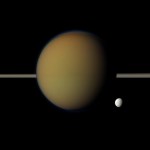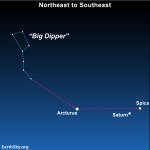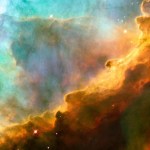cassini
"For most of the history of our species we were helpless to understand how nature works. We took every storm, drought, illness and comet personally. We created myths and spirits in an attempt to explain the patterns of nature." -Ann Druyan
Here on Earth, we are well aware of how devastating storms can be. From hurricanes to flash floods, an unpredictable change in weather can turn a serene setting into a catastrophe in no time at all. The clouds that fill the skies can often portend what type of weather is coming, and to me, the most impressive and fearsome of all is the rare and remarkable…
"Everyone is a moon, and has a dark side which he never shows to anybody." -Mark Twain
Back before the telescope was invented, Saturn was known as the Old Man of the Skies. The slowest-moving of the naked-eye planets, it's the only one that would reliably be in nearly the same location, year after year. You can find it all summer, after sunset, by following the "arc" of the handle of the big dipper all the way until you run into the brightest northern-hemisphere star, Arcturus, and then speeding on to the very bright Spica. Saturn is right next door.
Image credit: EarthSky.org.
But…
By Dr. Paul EstradaPlanetary physicist at the Carl Sagan Center for the Study of Life in the Universe, SETI Institute, and Gail Jacobs
If planets are a dime a dozen, moons are less than a penny each. There are at least 139 moons just within our own solar system. Most of these are the property of the gas giant planets beyond Mars. More than just a nice accompaniment to planets, moons may have habitats in which liquid water could ebb and flow - and possibly be a suitable home for life. Planetary physicist Dr. Paul Estrada investigates how moons around gas giants are formed -- an important…
By Dr. Mark R. Showalter
Planetary Astronomer at the Carl Sagan Center for the Study of Life in the Universe, SETI Institute
In 1609, Galileo introduced to the world his new invention, the astronomical telescope. It opened up new opportunities to explore a territory that all prior generations had regarded as familiar--the night sky. In short order, he was making major discoveries. But the sky is very big and Galileo's telescope was very small. He had to choose his targets carefully.
In that context, Saturn was nothing special, the least of the known planets, just a bright point in a black…
by Nathalie A. Cabrol
I realize how immodest the title of this first blog may sound and it is certainly not my intention to convince anybody that I will answer this question in the limited space allowed here or even in a lifetime. My hope is, instead, to stir thoughts and invite an exchange of diverse perspectives to make this a thread that we can all pull from time to time. It is an immense subject debated in an abundant literature, but discussing it is certainly not the exclusive privilege of those called explorers. All beings, from the greatest minds to the simplest forms of life on this…


